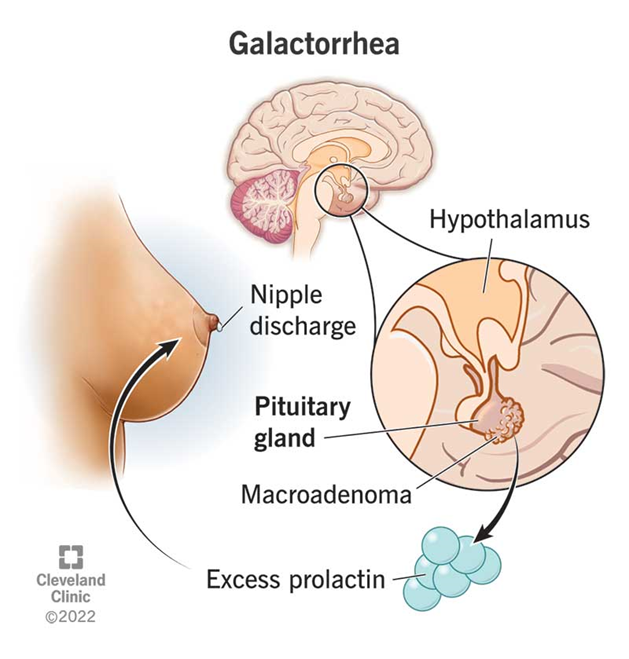Laboratory results reveal elevated levels of prolactin in a client diagnosed with Schizophrenia. Which symptoms should the nurse expect to observe? Select all that apply.
Galactorrhea
Gynecomastia
Social withdrawal
Apathy
Anhedonia
Correct Answer : A,B
Choice A reason: Elevated prolactin levels can lead to galactorrhea, which is the production of breast milk in individuals who are not breastfeeding.

Choice B reason: Gynecomastia, the enlargement of breast tissue in males, can also be a symptom associated with high prolactin levels.
Choice C reason: Social withdrawal is a symptom of Schizophrenia but is not directly related to elevated prolactin levels.
Choice D reason: Apathy can be a symptom of Schizophrenia but is not directly related to elevated prolactin levels.
Choice E reason: Anhedonia is a symptom of Schizophrenia but is not directly related to elevated prolactin levels.
Nursing Test Bank
Naxlex Comprehensive Predictor Exams
Related Questions
Correct Answer is D
Explanation
Choice A reason: Psychotic behavior is not common in postpartum depression; it is more associated with postpartum psychosis, a rare and severe form of the condition.
Choice B reason: Harming the infant is not a common manifestation of postpartum depression and is a misconception.
Choice C reason: Postpartum depression does not typically begin 48 hours after childbirth; this is more indicative of the "baby blues," which are less severe and more transient.
Choice D reason: Women with a history of depression are at a higher risk for postpartum depression, making this statement accurate.
Correct Answer is D
Explanation
Choice A reason: The concept that cooperative people become increasingly helpless over time does not align with psychosocial theories of personality disorder development. Cooperation is generally seen as a positive trait and is not typically associated with the development of personality disorders.
Choice B reason: Self-transcendence contributing to self-consciousness and materialism is not a recognized psychosocial factor in the development of personality disorders. While self-transcendence can relate to a person's sense of connectedness with the broader universe, it is not directly linked to personality disorders.
Choice C reason: Highly self-directed individuals are often seen as having a strong sense of autonomy and control, which is not typically associated with the development of personality disorders. Uncooperativeness and intolerance are not inherent in self-direction.
Choice D reason: Failure to complete a developmental task can lead to psychosocial issues, which may contribute to the development of personality disorders. According to Erik Erikson's stages of psychosocial development, if an individual does not successfully navigate a stage, it may impact their personality and could potentially lead to disorders.
Whether you are a student looking to ace your exams or a practicing nurse seeking to enhance your expertise , our nursing education contents will empower you with the confidence and competence to make a difference in the lives of patients and become a respected leader in the healthcare field.
Visit Naxlex, invest in your future and unlock endless possibilities with our unparalleled nursing education contents today
Report Wrong Answer on the Current Question
Do you disagree with the answer? If yes, what is your expected answer? Explain.
Kindly be descriptive with the issue you are facing.
